Dental Implants Parsippany
Healthy, Long-Lasting Tooth Replacement
Tooth loss may not seem that serious, especially if you’re missing a tooth that no one can see. However, there are long-term consequences of not replacing missing teeth. For example, without all of your teeth to stimulate your jawbone, your biting strength will diminish, making the act of chewing your favorite foods far more difficult or even impossible. At Rauchberg Dental Group, we can solve all of the problems of tooth loss with dental implants in Parsippany. Our board-certified in-house periodontist, Dr. Eunjung Shim, has several years of experience restoring patient’s smiles by placing dental implants. To learn more about this healthy, long-lasting tooth replacement, please call us today!
Why Choose Rauchberg Dental Group for Dental Implants?
- Implants Placed by Board-Certified In-House Periodontist
- Cutting-Edge Dental Technology Ensures Safe, Effective Treatment
- Convenient Dental Financing Options Available
What Are Dental Implants?
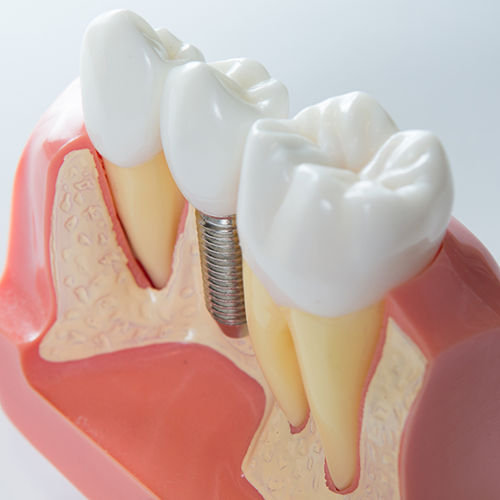
A dental implant is a small titanium screw that serves as the replacement for the root portion of a missing natural tooth. After being surgically placed in the jaw, a dental implant fuses with the surrounding bone due to the biocompatible properties of titanium. It can then support a dental crown, bridge, or denture, depending on how many teeth a patient has lost.
As the only tooth replacement to bring back the hidden root structure of a tooth, dental implants are the next best thing to the teeth you used to have. They look, feel, and function just like real teeth, allowing you to eat your favorite foods and smile with confidence. If you take good care of them, they can even last for 30+ years!
The 4-Step Dental Implant Process
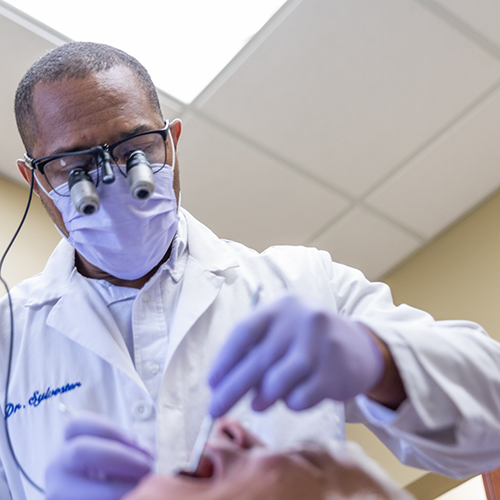
Having dental implants is wonderful, but there is a process you must first go through before you can begin enjoying your new smile. It may take anywhere from a few months to a year or even longer in total.
At Rauchberg Dental Group, we believe in providing our patients with all of the necessary information needed to make a well-informed decision. Since it is ultimately up to you to decide if dental implants are how you wish to replace your missing teeth, we invite you to review the four-step dental implant process below.
Initial Dental Implant Consultation

The initial consultation is designed to allow our team to examine your oral cavity and facial structure as well as explain the process, determine your candidacy, and answer any questions you might have about the procedure. If you are deemed eligible to receive dental implants, we will capture impressions of your smile and send these images off to a dental lab where technicians will begin to craft your finalized restoration. If we find that your jawbone is not strong enough to support your implant and restoration, we may recommend that you undergo a bone graft or sinus lift first.
Dental Implant Surgery

The day you arrive for dental implant placement, you will receive anesthesia to help keep you calm and comfortable throughout the procedure. Placing the appropriate number of implants along your arch, our in-house periodontist, Dr. Eunjung Shim, will make sure they are angled correctly within your jawbone before closing up the gum tissue around the implants and sending you home to recover.
Dental Implant Osseointegration/ Abutment
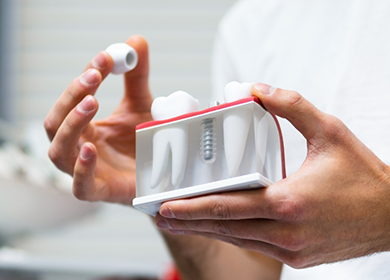
You will spend the next several months allowing osseointegration to occur. This process must be successful, as it requires the implants to properly fuse with your jawbone and surrounding tissues. Once this is complete, you will return to our office to have the metal abutments put into place. These metal appliances connect the implant to the final restoration. The gum tissue around the abutment will require a few weeks to heal before you enter the final phase of treatment.
Delivery of Dental Implant Restorations
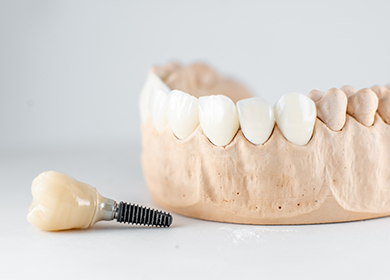
The final step in the dental implant process is receiving your restoration. Whether it is a dental crown, implant bridge, or implant denture, we will secure your artificial tooth to the top of your implant, allowing you to see a blended and seamless smile. The material used to create your restoration will blend in beautifully with the rest of your teeth, making it virtually impossible for anyone to tell the difference.
Benefits of Dental Implants

Dental implants continue to grow in popularity as a tooth replacement option with more than a half-million placed each year. Due to their insertion into the jawbone, implants provide benefits unmatched by more traditional options like dentures and dental bridges. If you are searching for a smile solution that can drastically boost your confidence, health, and quality of life, dental implants in Parsippany are the answer.
Day-to-Day Benefits

Dental implants have attributes you’ll be enjoying immediately after your treatment process is complete, like:
- They look, feel, and act like natural teeth. Dental implants mimic the natural tooth from root to crown. Since they are almost indistinguishable from natural teeth, you’ll feel confident knowing people you encounter won’t even realize you’ve had any treatment done.
- They restore bite force. You’ll return to eating the foods you love without discomfort or difficulty. Since they are anchored securely in the jawbone to provide a stable base for your replacement teeth, you can bite and chew certain foods that just aren’t accessible with dentures and dental bridges.
- They are easy to care for. Dental implants don’t require special care and can be brushed and flossed like natural teeth. It is important to maintain good oral hygiene to keep the implant and surrounding teeth healthy; after all, you want to protect your investment.
Health Benefits

While the health benefits of dental implants in Parsippany might not always be advantages you can see, they are certainly helping you in subtle ways, including:
- They can help your jawbone. Many people who suffer tooth loss also experience bone loss in the jaw. Dental implants do much more than provide a full smile again. Implants act as the tooth’s root and can also salvage the remaining jawbone.
- They can benefit your nutrition. You already know dental implants help your bite force. Consider that if you choose traditional dentures instead, your risk of malnutrition increases due to the inability to chew food thoroughly; dentures don’t have the stability to tear and grind food the way dental implants do. With implants, food digestion becomes easier for you.
- They boost your mental health. This point may seem surprising, but consider that dental implants give you peace of mind. With dentures, they could shift out of place when you are talking to someone or eating in public. Meanwhile, you know your implants are securely in position and look great, which gives you confidence.
Long-Term Benefits

Dental implants can pay huge dividends well beyond the first year you get them because:
- The success rate is over 90 percent. The vast majority of patients can count on their dental implants for 15 years or more. The success rate of dental implants is so high because the implants fuse to your jawbone via osseointegration. Unlike dentures, they’re not snapped into place or worn over your gums.
- Save money in the long run. As a permanent replacement for lost teeth, dental implants are a cost-effective option when you look many years down the road. Sure, with dentures or dental bridges, you will pay much less in year one. But with dental implants, you are much less likely to have dental problems in the years to come, which means fewer dollars spent and less stress as time goes on.
- Preserve your face shape. When teeth are missing, deterioration of the bone structure in the jaw often results due to the lack of utility. Mouths without teeth tend to have a sunken appearance since they are not exposed to chewing pressure or motion, and a poor bite may cause the chin to rotate inward. A few missing teeth can often create an aged and older appearance. Dentures and dental bridges won’t address bone deterioration, as your implant dentist in Parsippany can explain.
Who Dental Implants Can Help

We use dental implants to replace one tooth, multiple teeth, or even entire smiles. The type of restoration that you need will directly depend on the number of teeth you’re missing.
Missing One Tooth
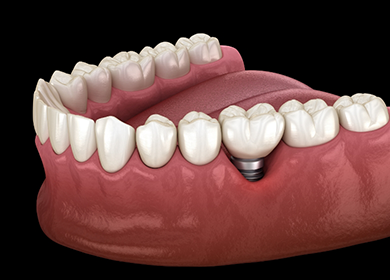
For a single missing tooth, we can place a crown on top of an implant post. This dental crown will be custom-made to mimic your natural dental structure and mounted to your implant, seamlessly completing your smile.
Missing Multiple Teeth
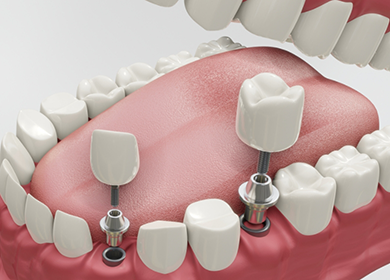
If you’re missing multiple teeth consecutively, then you could benefit from an implant bridge. This prosthetic literally “bridges” the gap in your smile and it’s supported by dental implants on either side for maximum biting power and stability.
Missing All Teeth
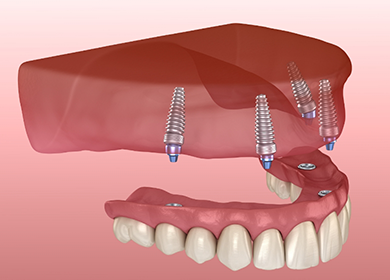
If you’re missing all or most of your teeth, we can use an implant denture to replace your whole smile. With an average of four to six strategically placed dental implants, we can anchor your dentures to your jawbone for a comfortable, stable, and functional full smile replacement.
Understanding the Cost of Dental Implants

The cost of your dental implants can range based on numerous factors, which is why it’s hard to give an estimate without examining your mouth first. Our expert periodontist will thoroughly check your mouth before developing a personalized treatment plan that includes your cost. Factors like the number of teeth you’re missing, the condition of your oral health, and the type of restoration that you need will influence the price of your treatment. Our friendly team will work hard to ensure that your treatment is as affordable as possible.
Types of Dental Implants
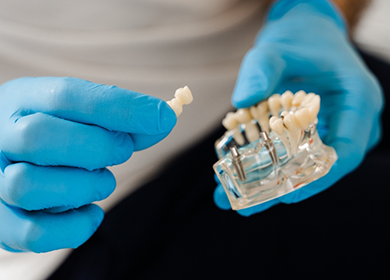
A dental implant consists of three main components: an implant post, an abutment, and the restoration. Each have separate costs. The number of posts and abutments necessary is determined by the restoration you need, such as a crown, bridge, or denture. Besides the restoration, the cost is also influenced by the materials that are used, such as titanium or ceramic posts.
What Are the Stages of Dental Implant Treatment?

Your treatment process consists of multiple phases, each with separate costs. This can make it easier for dental implants to accommodate your budget because it gives you more time to pay. On average, you can expect to pay for:
- Initial Consultation: Besides the office fees, you will need X-rays and a CT scan to assess your oral health.
- Additional Procedures: You may need bone grafting, tooth extractions, or a sinus lift before your placement surgery.
- Placement Surgery: Sedation or anesthesia is used while your oral surgeon opens your gum tissue to expose your jawbone. Small holes are created to allow the posts to be placed into the jawline.
- Abutments & Restorations: Abutments are connector pieces that are placed on your posts after your jawbone heals. Your restoration is attached to the posts using the abutments. This is often the most expensive aspect of the process.
Are Dental Implants Worth the Investment?
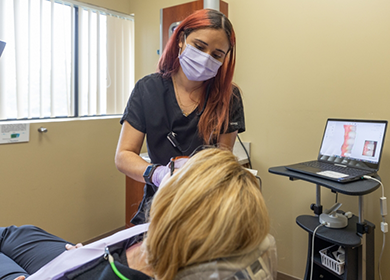
Dental implants cost more upfront than traditional treatments, but they are more affordable long-term because they never need to be replaced with the right aftercare. Not only can they last for several decades to save you money down the road, but they can also lower your overall dental expenses.
The implant posts stimulate your jawbone to preserve your oral health, including any remaining natural teeth. This reduces your risk of tooth decay, gum disease, TMJ disorders, and additional tooth loss to lessen the need for a costly treatment in the future.
Does My Dental Insurance Cover Dental Implants?

Unfortunately, it is rare for dental insurance to cover the entire cost of the treatment, but your specific policy may pay a portion of the procedure until you reach your annual limit. We work on your behalf with your insurance carrier to reduce the amount you need to pay out-of-pocket.
To cover any remaining balance, we accept a variety of payment options. Besides traditional payments, we also accept third-party financing through CareCredit. We will help you find the solution you need to stay within your budget.
Advanced Dental Implant Procedures

Having a healthy jawbone is essential for successful dental implant treatment. Just as a house needs to be built atop a strong foundation, the jawbone must be durable for implants to merge with it and deliver decades of great smiles. At Rauchberg Dental Group, we frequently encounter patients who would love to get dental implants but whose jaws are not quite ready to support them. That’s where these advanced preparatory treatments can help. Here are a few of the ways in which we can increase your chances of a successful dental implant procedure in Parsippany.
Bone Grafting
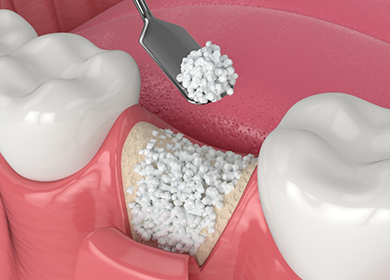
Every time you bite or chew, that force travels through the roots of your teeth and stimulates your jawbone. But when teeth are lost, the bone also loses that stimulation and gradually deteriorates. Eventually, it may not be strong enough to give dental implants the support they need, leading to implant failure.
We have helped countless patients overcome this issue with bone grafting in Parsippany. During this procedure, we transplant bone tissue (which can be artificial material, from a donor, or from elsewhere on your body) onto the weakened area of your jawbone, encouraging it to become stronger. Although this bone growth can take several months, it’s vital for the long-term success of your new teeth.
Sinus Lift
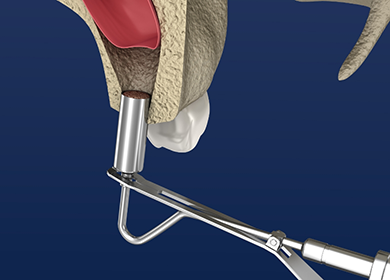
Placing dental implants in the upper back jaw can be difficult, as the area is close to the sinuses and tends to have less bone density. To make dental implant treatment easier, we may need to perform a sinus lift beforehand. First, we make a tiny incision in the gums through which we can open the exposed bone. Then, we gently raise the sinus membrane and deposit bone grafting material into the newly created space, bolstering the jawbone in exactly the right location. After you’ve recovered from your sinus lift in Parsippany – which generally takes anywhere from four to nine months – you’ll be ready to undergo dental implant surgery.
PRP/PRF Treatment
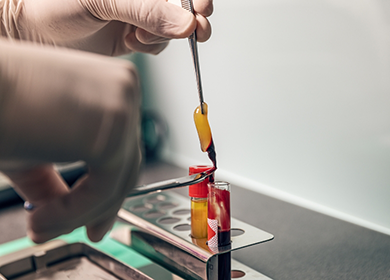
In addition to having a sturdy jawbone, good candidates for dental implants should be able to heal from their surgery with little risk of complications. To ensure a successful recovery, we can administer platelet-rich plasma or platelet-rich fibrin to the surgical site after your procedure. Platelets contain growth factors that dramatically quicken your body’s ability to heal. As a result, you’ll be less likely to require strong pain medication and anti-inflammatories following your surgery. Additionally, your risk of post-op infections and other complications is lowered significantly. Best of all, you won’t have to wait as long to get your new teeth!
Ridge Expansion
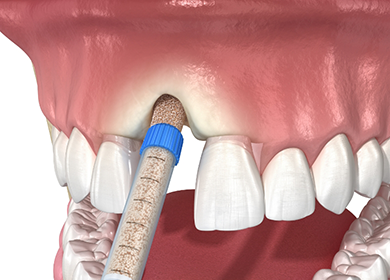
We may recommend a ridge expansion if we discover that your jaw is currently not wide enough to sufficiently support dental implants in Parsippany. Our dentists will use specialized dental instruments to create a divide in your ridge bone and wedge apart the inner and outer sections of bone. This space is then filled with bone grafting material. Depending on your circumstances, we may even be able to place dental implants at the same time as your ridge expansion.
Dental Implant FAQs
Why is it important to have a healthy jawbone for dental implants?
Your jawbone performs two functions: it supports your teeth, and it forms your facial structure. Once a tooth is lost or extracted, this bone too starts to naturally lose density, and as a result, your face can change shape and appear older. Also, the weakened jawbone can fail to provide the proper support that your remaining healthy teeth need, potentially causing further tooth loss.
What preliminary work would I need before getting dental implants?
If you lack sufficient jawbone density before the placement procedure, it may not provide enough support for the implant. In such cases, we may be able to perform a bone graft to bolster the jawbone and get it ready for implants. We can discuss any required preliminary procedures during your consultation.
How do I make my dental implants last?
In general, dental implants have a high success rate even long after they’ve been placed. In fact, ten years after placement, about 95 percent are still successful, but in order to prolong your implants’ lifespan, you need to take care of them. Luckily, you maintain your dental implants in the exact same way that you should your natural teeth, meaning that you need to brush and floss daily and visit our office every six months for checkups and cleanings. If you do these things, there’s no reason why your dental implants shouldn’t last for 30 or more years!
Can I continue to wear my removable dentures with dental implants?
Some prefer the convenience of having removable dentures, but they still want the security and health benefits that dental implants provide. We can offer an option that allows you to snap your dentures into place, holding them firmly in position, yet still allowing you to remove them for cleaning. Just make sure to let us know your preferences and we’ll be sure to accommodate you!
Are dental implants right for me?
Dental implants may be your best tooth replacement option if you are in good oral health, and you have enough jawbone to support the implant. At your consultation with us, our experts will review a 3D scan of your oral structures and determine your eligibility for the procedure. Our team knows how to set you up for success and enable you to enjoy all the benefits of dental implants.
I Need a Checkup & Cleaning I Need a Dentist for My Child I Have a Cavity or Broken Tooth I'm Missing One or More Teeth I Want to Enhance My Smile I Want a Straighter Smile I Have a Dental Emergency I Have Sleep Apnea/Snore I am Worried About Gum Disease I Have Jaw Pain/Headaches I am Scared of the Dentist View Our Services
